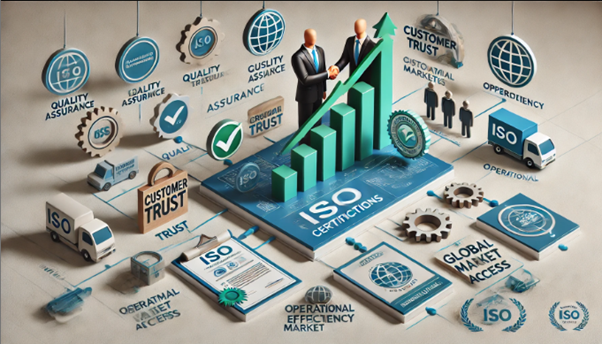
How ISO Certifications Can Help Small Businesses Scale Up
Scaling a small business is challenging. As businesses grow, they must deal with operational efficiency, quality control, regulatory compliance, and customer trust—all while competing with larger enterprises.
One of the most effective ways for small businesses to achieve sustainable growth and expansion is by obtaining ISO certification. Whether it’s improving quality, security, or efficiency, ISO certifications provide a structured framework that helps small businesses scale up successfully.
But how exactly can ISO certifications support small business growth? Let’s explore.
1. What is ISO Certification?
ISO (International Organization for Standardization) develops globally recognized standards that ensure quality, efficiency, safety, and security across various industries.
Common ISO certifications for small businesses include:
📌 ISO 9001 – Quality Management System (QMS)
📌 ISO 14001 – Environmental Management System (EMS)
📌 ISO 27001 – Information Security Management System (ISMS)
📌 ISO 45001 – Occupational Health & Safety (OHS)
📌 ISO 22000 – Food Safety Management System (FSMS)
These certifications help businesses meet industry standards, improve processes, and gain credibility in the market.
2. How ISO Certifications Help Small Businesses Scale Up
a) Enhancing Credibility & Winning More Clients
✔ ISO certification boosts a company’s credibility in the market.
✔ Many large corporations and government agencies require ISO-certified suppliers.
✔ Certified businesses have a competitive edge in securing high-value contracts.
Example: A small manufacturing firm with ISO 9001 certification can attract international buyers who prioritize quality and consistency.
b) Improving Operational Efficiency
✔ ISO standards promote structured workflows and process optimization.
✔ Businesses can reduce waste, increase productivity, and cut operational costs.
✔ A streamlined operation makes scaling easier and more sustainable.
Example: A small IT company implementing ISO 27001 ensures data security best practices, leading to better risk management and operational stability.
c) Expanding into New Markets & Industries
✔ Many industries require suppliers and partners to comply with ISO standards.
✔ ISO certification simplifies market entry into international and regulated industries.
✔ Small businesses can scale beyond local markets and reach global customers.
Example: A startup with ISO 22000 (Food Safety) can export food products internationally, unlocking new revenue opportunities.
d) Strengthening Customer Trust & Satisfaction
✔ Customers trust ISO-certified businesses because they meet global quality and safety standards.
✔ ISO ensures product and service consistency, leading to higher customer satisfaction and retention.
✔ A strong reputation helps businesses grow through positive word-of-mouth and referrals.
e) Ensuring Regulatory Compliance & Risk Management
✔ Scaling businesses face increased legal and regulatory challenges.
✔ ISO certifications help companies stay compliant with industry and government regulations.
✔ Reduces the risk of penalties, lawsuits, and reputational damage.
Example: A growing construction company with ISO 45001 (Occupational Health & Safety) ensures safer workplaces, reducing the risk of accidents and compliance violations.
f) Attracting Investors & Business Partners
✔ Investors prefer businesses that follow international standards.
✔ ISO certification demonstrates long-term sustainability, efficiency, and risk management.
✔ Certified businesses are more likely to secure funding for expansion.
Example: A small logistics firm with ISO 14001 (Environmental Management) can attract investors focused on sustainable business practices.
3. Steps to Get ISO Certified for Small Businesses
Step 1: Choose the Right ISO Standard
🔍 Identify which ISO certification aligns with your business goals and industry.
🔍 Research client or regulatory requirements (e.g., ISO 9001 for quality, ISO 27001 for cybersecurity).
Step 2: Develop an Internal ISO Management System
📌 Establish policies, processes, and documentation based on ISO guidelines.
📌 Train employees on ISO compliance and implementation.
Step 3: Conduct an Internal Audit
📌 Perform an internal audit to check for compliance gaps.
📌 Address any non-conformities before the official audit.
Step 4: Get Certified by an ISO Accreditation Body
📜 Choose a certified ISO registrar to conduct an external audit.
📜 Upon successful audit completion, receive your ISO certification.
Step 5: Maintain Compliance & Continuous Improvement
✅ Conduct regular audits to ensure compliance.
✅ Continuously improve processes, risk management, and employee training.
4. Common Myths About ISO Certification for Small Businesses
🚫 "ISO certification is too expensive for small businesses."
✅ Many certification bodies offer affordable solutions for startups and SMEs.
🚫 "Only large companies need ISO certification."
✅ Small businesses benefit even more by gaining credibility and operational efficiency.
🚫 "ISO certification is a one-time process."
✅ Businesses must maintain and improve compliance to retain certification.
🚫 "It takes years to get ISO certified."
✅ With proper planning, ISO certification can be achieved in months.
5. The Future of Small Businesses with ISO Certification
As industries become more regulated and competitive, small businesses will increasingly adopt ISO standards to:
🚀 Leverage automation and AI to enhance compliance tracking.
🚀 Expand into digital and global markets with recognized quality standards.
🚀 Improve supply chain transparency and sustainability efforts.
ISO certification is not just a badge—it’s a growth tool that helps small businesses scale faster, reduce risks, and achieve long-term success.
6. Conclusion: Why Small Businesses Should Invest in ISO Certification
ISO certification is a game-changer for small businesses looking to scale up efficiently.
✔ Increases credibility & wins more contracts
✔ Optimizes operations & reduces costs
✔ Ensures compliance & reduces business risks
✔ Attracts investors & expands market reach
✔ Improves customer satisfaction & brand reputation
💡 Ready to take your small business to the next level? Contact us today to start your ISO certification journey and unlock new growth opportunities! 🚀✅